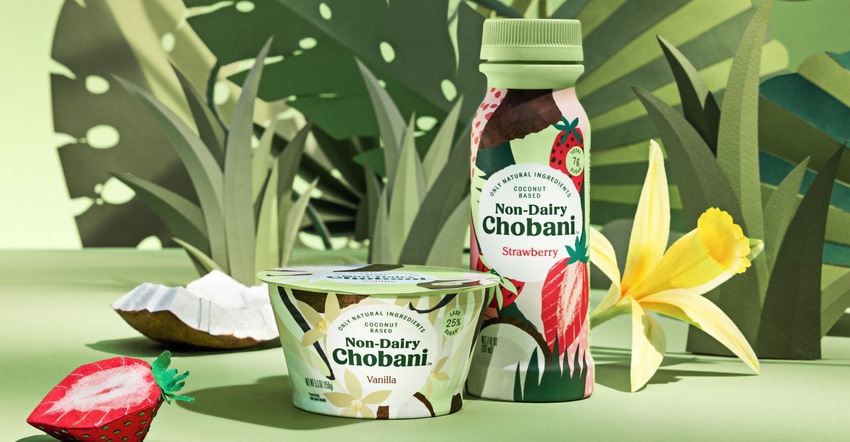Chobani’s plant-based recipe clearly states it is non-dairy and does not use the words "milk" or "dairy" on label.

In January, Chobani launched Non-Dairy Chobani, the company’s first-ever plant-based recipe, with nine new cultured organic coconut products that will be available nationwide at grocery and retail stores. The move was welcomed by industry groups because of its transparent approach to labeling the non-dairy product.
In a news release announcing the new line, Chobani said, “As an independent food company, Chobani is taking a leadership role in advocating for transparency in dairy and clear distinctions between milk-based foods, such as yogurts, and other options like our Non-Dairy Chobani cultured organic coconut purees. Chobani believes consumers are more empowered when food companies accurately describe foods and the nutritional benefits they offer.”
In a Feb. 18 letter to Chobani chief executive officer Hamdi Ulukaya, National Milk Producers Federation (NMPF) president and CEO Jim Mulhern thanked the company for supporting transparency in the use of dairy terms on food product labels -- the subject of a recently ended Food & Drug Administration comment period.
“As you state in your company’s comments, ‘The improper – and illegal – use of dairy terms on plant-based alternatives poses a public health risk in that this terminology may confuse consumers and cause them to displace the nutrients that would otherwise be provided by dairy foods,’” Mulhern wrote on behalf of NMPF. “We at National Milk share your concerns that consumers are being misled over the nutritional content of dairy versus plant-based products, and we appreciate your willingness, as the number-one seller of Greek yogurt in the U.S. and the nation’s second-largest yogurt manufacturer, to use your voice to speak out on this issue.”
Mulhern also noted that Chobani follows FDA rules and eschews the use of dairy terms on its non-dairy products -- a contrast with competitors that flout proper practices to the detriment of consumers.
“We will always strongly advocate for dairy as the superior consumer choice, but we have no objection to the presence of properly labeled plant-based imitators,” Mulhern wrote. “As Chobani is showing, such products can compete on their own merits without misappropriating dairy terms. We wish your example would be emulated by your competitors, including Danone North America, that currently peddle mislabeled products.”
NMPF continues to find support on Capitol Hill for upholding the definition of milk. A group of members of Congress, led by Reps. John Joyce (R., Pa.) and Anthony Brindisi (D., N.Y.), have urged FDA to enforce “regulations defining what may be labeled a dairy product to combat the proliferation of imitation and substitute dairy products in the marketplace that undermine FDA regulations by using standardized dairy terms on non-dairy products,” NMPF said.
“Dairy product terms convey specific information for consumers on nutritional content and ingredient performance. Put simply, imitations and substitutes do not meet these standards, nor do they have any standardized requirements for nutritional content, composition and processing, unlike the dairy products they seek to imitate. Most importantly, they are not sourced from cows or other lactating mammals, as required by the standards we referred to up above,” the letter asserted. “Giving this ongoing problem, we are pleased that FDA now plans to act. We urge you to make crystal clear that dairy imitators will not be considered in compliance with standards of identity if they merely add the name of a plant in front of a standardized dairy term or otherwise reference dairy terms.”
About the Author(s)
You May Also Like



.png?width=300&auto=webp&quality=80&disable=upscale)

